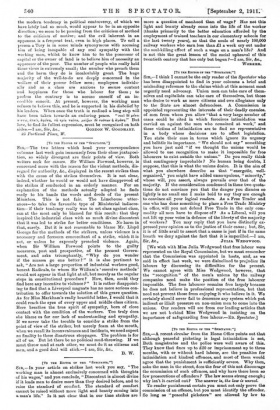[To THE EDITOR OF THE " SPECTATOR...1
Sea,—I think I cannot be the only reader of the Spectator who has been disappointed to find in your columns a brief and misleading reference to the claims which at this moment most urgently need advocacy. Union men can take care of them- selves and capitalists can take care of themselves, but those who desire to work as mere citizens and owe allegiance only to the State are almost defenceless. A. Commission is appointed representing the interests of their deadly enemies. of men from whom you allow "that a very large number of cases could be cited in which ferocious intimidation was carried on against the men who remained at work," and these victims of intimidation are to find no representative in a body whose decisions are to affect legislation. You state their case in terms which ignore its urgency and belittle its importance. " We should not say " something you have just said " if we thought the unions would be allowed to use recognition to make it impossible for free labourers to exist outside the unions." Do you really think that contingency improbable ? No human being doubts, I suppose, that this is what the unions desire. It is the aim of what you elsewhere describe as that " energetic, well- organized," you might have added unscrupulous, " minority," whose will, you assert, always prevails over that of the majority. If the consideration condensed in these two quota- tions do not convince you that the danger you dismiss so lightly is no small one I make bold to say they are enough to convince all your logical readers. As a Free Trader and one who has done something to place a Free Trade Ministry in office, will you not defend Free Trade in the only com- modity all men have to dispose of P As a Liberal, will you not lift up your voice in defence of the liberty of the majority of workers P You may reply that you have distinctly ex- pressed your opinion as to the justice of their cause ; but, Sir, it is of little avail to assert that a cause is just if in the same breath we deny against the fact that it is imperilled.—I am, [We wish with Miss Julia Wedgwood that free labour were represented on the Royal Commission, but we must remember that the Commission was appointed in haste, and, as we said in effect last week, we were disinclined to prejudice its labours by discussing its difficulties for the present. We cannot agree with Miss Wedgwood, however, that the " recognition " of the men's unions by the railway companies need make the position of the free labourer impossible. The free labourer remains free largely because be does not believe in professional representation, but that need not prevent those from enjoying it who believe in it. We certainly should never fail to denounce any system which putt indirect or illicit pressure on non-union men to come into the unions. Our readers will see from our leading articles that we are not b ehind Miss Wedgwood in insisting on the importance of safeguarding free labour.—En. Spectator.]






































 Previous page
Previous page